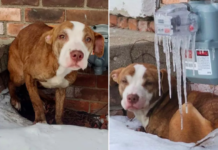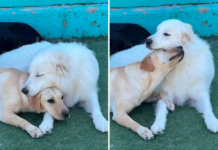Last Updated on August 30, 2023 by Fumipets
13 Things to Do When Your Dog Dies
Saying goodbye to a beloved canine companion is a heart-wrenching experience. During this difficult time, it’s important to know the steps to take to honor your dog’s memory and navigate the practical aspects of their passing.
Here’s a summary of things to do when your dog dies, along with answers to some common questions:
Honor and Remember:
- Take Time to Grieve: Allow yourself and your family to process the loss and share memories of your dog’s life.
- Create a Memorial: Consider creating a memorial space or planting a tree in their memory.
- Keep Mementos: Preserve items like collars, toys, and photos to cherish your dog’s memory.
Practical Steps:
- Inform the Vet: If your dog passes away at a veterinary clinic, they can guide you through the next steps.
- Decide on Aftercare: Choose between burial, cremation, or other aftercare options based on your preferences.
- Notify Others: Inform friends, family, and anyone who interacted with your dog of their passing.
Coping and Healing:
- Seek Support: Lean on friends, family, or support groups to help you cope with your grief.
- Celebrate Their Life: Consider hosting a gathering to celebrate your dog’s life and the joy they brought.
Saying farewell to a close friend is never simple, particularly if that person was also your frequent companion and cuddle partner. You may be feeling overwhelmed if your dog is nearing the end of his life or has just died away.
Clear thinking is difficult when your heart is hurting. Nobody expects you to have it all together, so don’t worry, buddy. However, if you need some assistance to get through it, here is a list of things to do when your dog dies.
How to Prepare for Your Dog’s Passing
Even while it’s not always feasible, if you can get a few things done before your dog dies, it will help the transition go more smoothly.
1. Ask Questions
Consult your veterinarian about potential changes that can arise over time if your dog has a health issue or is just aging. Knowing what to anticipate might help you be ready to face new obstacles.
It’s also a good idea to talk to your vet about pet euthanasia (putting your dog to sleep) and how this service is carried out, as well as post-euthanasia choices like burial and cremation if you believe your dog may be reaching the end of their life. To provide these services after your dog goes away, veterinarians often collaborate with businesses.
To find out more about their services, you may also get in touch with other providers who focus on providing end-of-life care (such as veterinarians who do euthanasia in your house).
Never be embarrassed to inquire about how your pet will be cared for; after all, it is your pet and a part of your family, so you should not be hesitant to get all the information you want.
2. Lean on Your Veterinarian
The toughest choice you’ll ever have to make as a pet owner is whether or not to put your dog to sleep. The best response to that question is up to you, although it’s helpful to have your vet’s professional opinion.
Whether your dog is in pain is an important factor to take into account. If you’ve tried everything to help your dog feel better, your vet can tell you. You may also talk about whether it makes sense to keep up the testing and care if your pet’s condition is only going to get worse.

3. Have a Plan
After doing some study, you’ll probably have a clearer idea of how you want your dog to spend his last moments. An end-of-life strategy could consist of:
- If using hospice care to make your pet comfortable in their last days is a smart option,
- When euthanasia is appropriate for both you and your pet (for instance, when he is unable to walk),
- Who will administer euthanasia Where you would want it to occur (for example, a veterinary facility, your house, or a park)
However, it’s important to realize that not everything always goes as planned. Just make the most of the circumstances that are presented to you. The most important thing is that your pet will always remember how much you and they loved one other.
4. Spend Quality Time With Your Dog
Our most finite resource is time. Once it’s gone, you can’t obtain more of it. Therefore, savor the time you still have with your canine companion. Spend time with your pet doing the activities they like.
Does your dog still like fetching balls, although it takes more effort now? Simply let him play with the ball in his mouth or roll it to him on the ground. If neighborhood strolls aren’t feasible, think about putting your dog in a wagon or a dog stroller so they can get some fresh air.
Even simply being in the same room with each other is time well spent. Your presence will provide your dog comfort.
5. Give Your Workplace a Heads Up
Bergeland advises that if you have a rough estimate of when your dog may die, you might wish to let your employer know. They will be informed in advance if you anticipate needing time off.
6. Determine What Services You Want
If you haven’t already made a decision on what you want to do with your pet when he passes away, you should do so right away. The veterinarian who handled the procedure should advise you of your alternatives if your pet has to be put to sleep. As home burials for dogs are often prohibited by municipal and town rules, cremation is the most popular option. There may be a local pet cemetery, in which case burial is an option.
7. What to Do if Your Dog Dies Naturally at Home
Although it may be simpler to go straight to a pet cemetery or crematorium if your dog passed away suddenly at home, you might ask your veterinarian for assistance. Your pet will need to be brought to their facilities in any case. Your veterinarian or animal control may dispose of the corpse for you if you are unable to pay for the necessary procedures. Typically, a communal (collective) cremation is used to accomplish this.
8. Give Yourself Time to Grieve
Pets belong in the family. So it’s entirely OK to feel sad when your dog passes away. As you grieve, be kind to yourself and remember that it will take time for you to recover. Don’t hurry things, advises Bergeland. You (as well as your pet) deserve this trying time.

9. Find Support
Sharing your sorrow with loving friends and family may often help you cope with the loss of a pet. Online groups are another place to discover pet owners who can relate to what you’re going through. Alternatively, you might ask your vet whether there is a nearby helpline or support group for pet loss.
Don’t be hesitant to ask for assistance if you’re finding it difficult to deal with the loss. Look for pet-related support groups or see a therapist or social worker. It’s crucial to speak with someone who can assist you in recognizing and processing what you’re going through.
10. Support Your Kids and Other Pets
Your whole family will find this painful, but small children who have never lost a loved one may find it especially challenging. If your child has lost a pet, the American Academy of Child and Adolescent Psychiatry (AACAP) suggests using the following conversation starters:
Make your children as comfortable as possible
Tell them in a familiar setting
Be honest and accurate in telling the kids that their pet died and what that means
Answer your child’s questions simply and honestly
Talk with your child about their feelings
Offer reassurance and comfort
Give your kids time to mourn and remember their beloved pet
According to a new research, our puppies could grieve the loss of other canines they live with. They are very sensitive to the feelings of their relatives. Any remaining pets you own thus need your care, affection, and assistance now more than ever.
11. Honor Your Pal
Making an enduring gift that honors the unique position that pet parents’ pets had in their hearts and their lives may be helpful for many pet owners. There are several methods to achieve this; just conduct a search online. Some pet memorial suggestions include wearing a necklace with your dog’s paw print, commissioning art, or putting your pet’s ashes in an urn. It may also be as easy as keeping one of your dog’s favorite toys around or framing some of the cutest photos you have of your pet.
Keep in mind that the decisions you make for your pet’s last days and memories are very personal. Despite suggestions from others, you are the only one who can decide what is best for you and your pet.
12. If Possible, Avoid Other Major Life Changes Right Now
Even if it can’t always be avoided, deciding to disappear for a while you can ease the adjustment when your pet goes. The stress of losing your pet might be made more challenging by major life changes like moving to a new home or changing employment. Allow yourself some time and space to devote some attention to your own mental and emotional health.
13. Consider the Effects of a New Pet in the Home
Even though you’ll probably miss your beloved pet for a very long time, it may not be a good idea to get a new dog or puppy until everyone in the family—both humans and other animals—is prepared. The pleasure a new pet will offer you all one day will be immeasurable, yet a pet can never be replaced.
Allow yourself time to mourn, and then when everyone in the family agrees that the timing is ripe for a new furry family member—a few weeks, months, or even years—hold a family meeting.
Common Questions:
How do I know when it’s time to say goodbye?
Consult with your veterinarian to assess your dog’s quality of life and make an informed decision.
What do I do if my dog passes away at home?
Contact your veterinarian or a local pet cremation service for guidance on aftercare options.
Can I bury my dog in my backyard?
Laws and regulations vary by location. Check local ordinances and consider pet cemeteries as an option.
How can I help children cope with the loss of their dog?
Be honest and age-appropriate in explaining the situation. Provide a safe space for them to express their feelings.
When is the right time to get another dog?
Grief is personal, and there’s no timeline for getting another dog. Wait until you’re emotionally ready.
Losing a dog is a deeply emotional experience, and taking care of practical matters while honoring their memory is essential. Give yourself the time and space to grieve, and remember that seeking support from loved ones can provide comfort during this challenging time.
https://www.youtube.com/watch?v=h6iCei3yqls


















